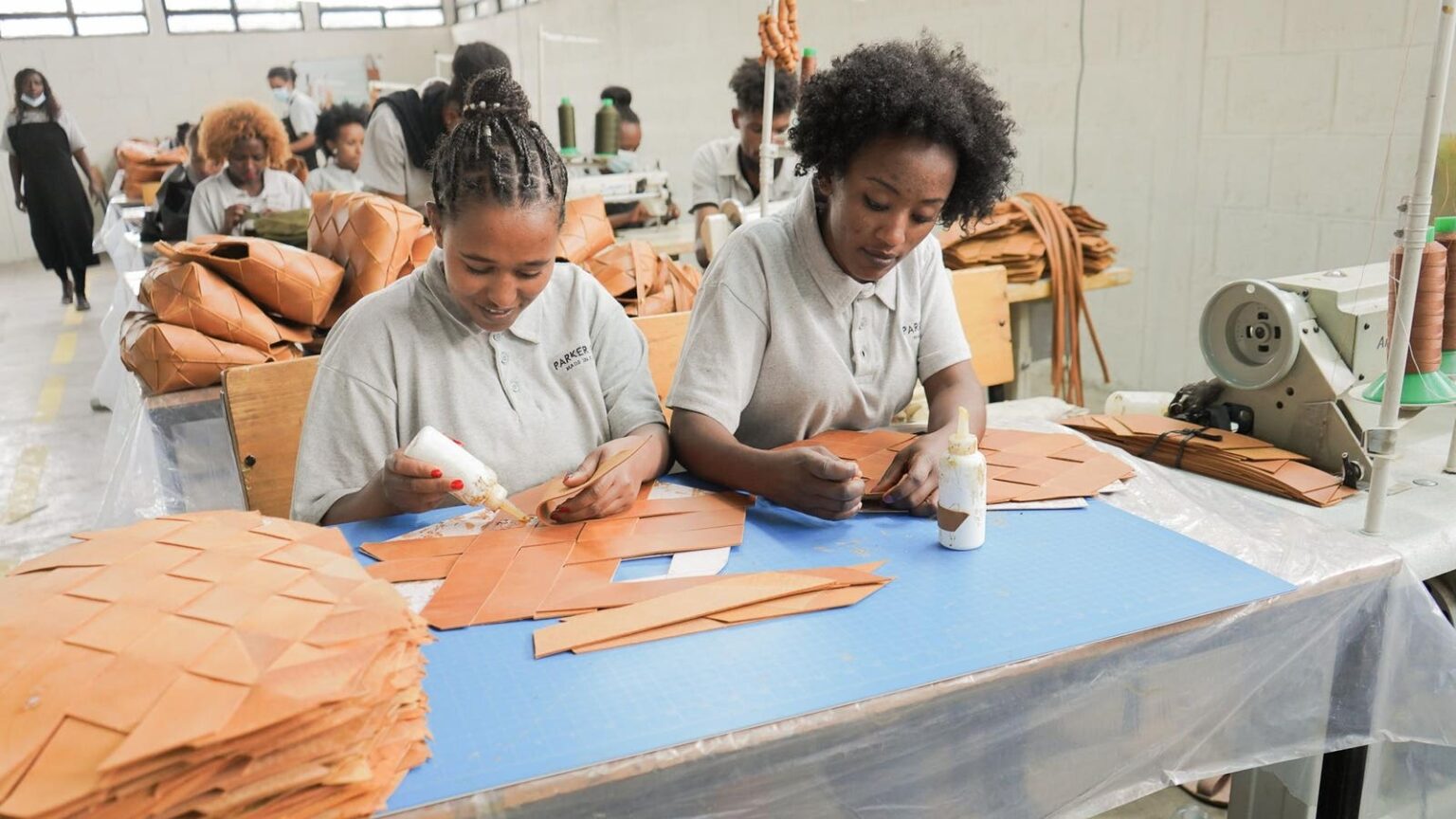The global leather goods industry stands at a critical juncture. With an overall market size valued at USD 242.85 billion in 2022 it is projected to expand 6.6% from 2023 to 2030. However, traditional leather production is often linked to environmental degradation and exploitative labor practices. More than 90% of global leather production uses chrome tanning methods that can harm both workers and the environment. When dumping liquid and solid waste that contains leftover chromium, the runoff and scraps can be consumed by animals and subsequently by human. In addition, UNICEF reports that child labor remains prevalent in leather production, while all tannery workers frequently suffer from prevalence of diarrhea, blood pressure, asthma, and skin disease.
Against this backdrop, Parker Clay has emerged as Ethiopia’s largest leather goods exporter, showing that companies can operate with a commitment to ethical practices and community engagement. Recently recognized by the U.S. State Department’s Award for Corporate Excellence in 2023, the company owns and operates its factory in Ethiopia, which allows it to maintain direct oversight of its entire production process. This vertical integration enables Parker Clay to ensure both environmental responsibility and fair labor practices throughout their supply chain.
Under the leadership of co-founders Brittany and Ian Bentley, Parker Clay has become a certified B Corp, and has focused on women’s empowerment in Ethiopia, where the UN reports that the gender pay gap for hourly workers is over 30 percent. Through partnerships with local organizations such as Ellilta Women at Risk (EWAR), the company provides job training, financial literacy programs, and career advancement opportunities for women who are often marginalized. Their collaboration with women-led banks like Enat Bank in Addis Ababa extends financial inclusion to workers who previously had limited access to banking services.These initiatives foster economic independence and social mobility and contributes to a ripple effect within the broader community.
The following interview with Brittany Bentley delves into Parker Clay’s approach to sustainable fashion and explores the strategies they have employed to balance growth with a mission-driven model. We discussed several key strategic decisions, particularly their choice to own their factory and focused on their women’s empowerment initiatives, excited to learn that hundreds of women graduate from their programs annually, with over 90% remaining economically independent. Brittany also addresses the challenges of scaling an ethical business, particularly during global crises like COVID-19 where they turned the challenge into an opportunity through the “Better Together” campaign.
We also touched on the company’s journey to becoming a B Corp and its innovations in transparent sourcing. Looking to the future, Brittany explored Parker Clay’s expansion into private label manufacturing and position them to influence ethical production practices across the broader fashion industry. Through its commitment to “a better bag for a better world,” Parker Clay’s journey from a mission-driven startup to Ethiopia’s largest leather goods exporter offers valuable lessons for how the fashion industry can rethink its practices to create a more equitable future.
Christopher Marquis: Congratulations on winning the Award for Corporate Excellence! How does receiving this prestigious recognition from the U.S. State Department reflect on the journey and mission of Parker Clay?
Brittany Bentley: Thank you so much! Winning the ACE Award is an incredible honor and a validation of everything we’ve worked for. This recognition reflects the heart of our mission—to empower women in Ethiopia through fair wages, benefits, and economic opportunity. From the beginning, our goal has been to prove that ethical business practices aren’t just an act of charity—they make sense for the future of fashion, especially in a world where consumers are becoming more conscious about their purchases. Receiving this award confirms that our model of creating high-quality leather goods in a way that uplifts the artisans who craft them is working. It’s not only about making better products; it’s about building a better, more inclusive future for fashion, starting in Africa.
Marquis: A core aspect of your mission is empowering women in Ethiopia. Could you elaborate on the specific ways Parker Clay has supported women’s economic advancement, and what results you’ve seen over the years?
Bentley: A key part of our mission is hiring at-risk women and providing them with living wages, benefits, and opportunities for career advancement. We offer skills training and financial literacy programs to ensure that our employees can build sustainable futures. One of our most impactful partnerships has been with Ellilta Women at Risk (EWAR), an organization that supports women who have been exploited through prostitution. Together, we aim to restore independence and create lasting change, helping 100’s of women graduate from their program each year, with more than 90% remaining free from exploitation. Education is also really central to what we do. At the most fundamental level, training women to become leather artisans allows them to earn a living wage with benefits, while honing their trade and picking up vital skills. Other educational opportunities include topics like management training, business language, and computer skills to further their potential future prospects. And lastly, non-professional learning opportunities include things like our financial literacy course. When we discovered that many of the women on our team had never received a consistent salary or opened a savings account, we wanted to ensure they were being set up for success. We partnered with Enat (“mother” in Amharic), which is a women-led bank here in Addis Ababa, to offer financial training to our employees.
Marquis: Building an ethical and sustainable fashion model comes with challenges. What have been some of the biggest hurdles you’ve encountered in establishing a sustainable supply chain in Ethiopia, and how have you overcome them?
Bentley: COVID was a challenge for everyone, with businesses struggling across the board. For us, it became an opportunity to rely on the community we had built. That’s when we launched “Better Together,” which was essentially our first version of an investment campaign. Customers could invest in our future by purchasing long-term gift cards and receiving discounts on future products. During a time of uncertainty and financial stress, we turned to our loyal customer base, and they showed incredible trust and support. The enthusiasm and growth we witnessed from that initiative were truly remarkable and inspiring to see. Our community has been the backbone to our story and it’s what has enabled us to overcome the challenges.
Marquis: Parker Clay is a certified B Corp. Can you share what that certification process was like, and how it has influenced your company’s practices and priorities?
Bentley: Becoming a Certified B Corporation was definitely a lot of time, cost, and paperwork, but it was also an incredibly valuable process. B Lab, the nonprofit behind the certification, evaluates companies at every level to ensure they meet the highest standards of social and environmental performance, public transparency, and legal accountability. The assessment goes beyond just production—it examines how business practices create a positive impact across the board.
For Parker Clay, achieving B Corp certification allowed us to take a deep dive into all aspects of our operations, from product packaging to employee well-being, ensuring that everything we do—both in the U.S. and Ethiopia—upholds the highest standards for people and the planet. What’s exciting is that the certification is just the beginning. It’s a commitment to continuously evaluating and improving our practices as we grow. For us, it’s critical that we don’t just focus on the end product but prioritize the well-being of people and the environment throughout the entire process. For too long, businesses have prioritized lower costs at the expense of people and the planet. At Parker Clay, we believe there’s a better way—a better bag for a better world.
Marquis: Growing as a business while staying true to its core values can be a challenge. How do you balance growth with your mission of empowering workers and maintaining ethical manufacturing practices?
Bentley: This is such an important question. Over the years we have come back to our core values many times to ensure they are true to our actions. We can’t just set them and forget them, it’s an active conversation around living them out. Our culture is constantly faced with compromise, and yet we are seeing a stronger movement today around consumers who are not willing to compromise around their product choice and its impact. Our core purpose is empowering women to thrive. We know that what we know matters but who we are matters more and this is why we live by being courageous around mission. Since we have been pioneering in many ways the past decade, we also know that we win or learn, taking smart risks that take us forward or teach us, with optimism and positivity driving every move.
So while we see others taking shortcuts, we know that to build something that endures you have to try new things and challenge the status quo, all without compromising.
Read the full article here











